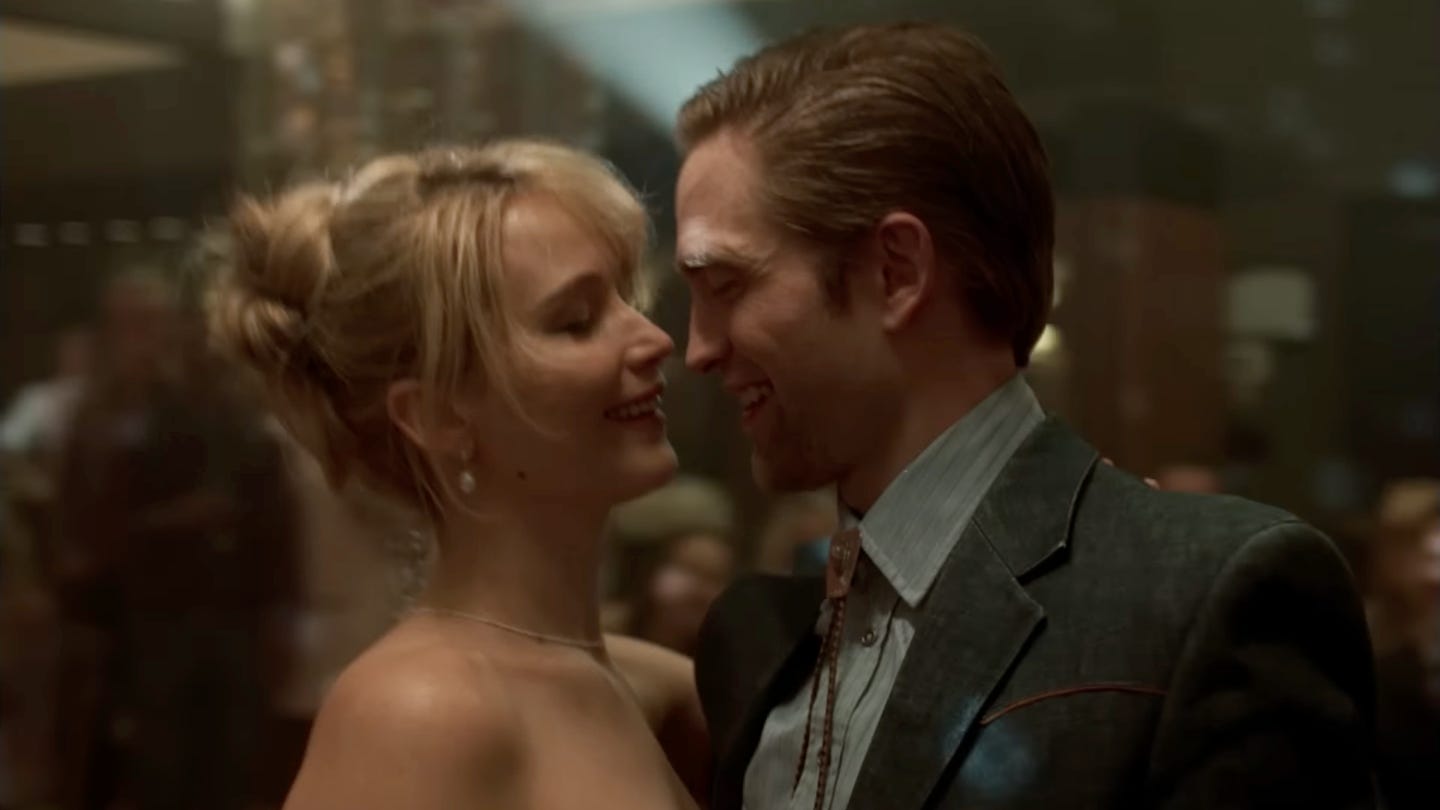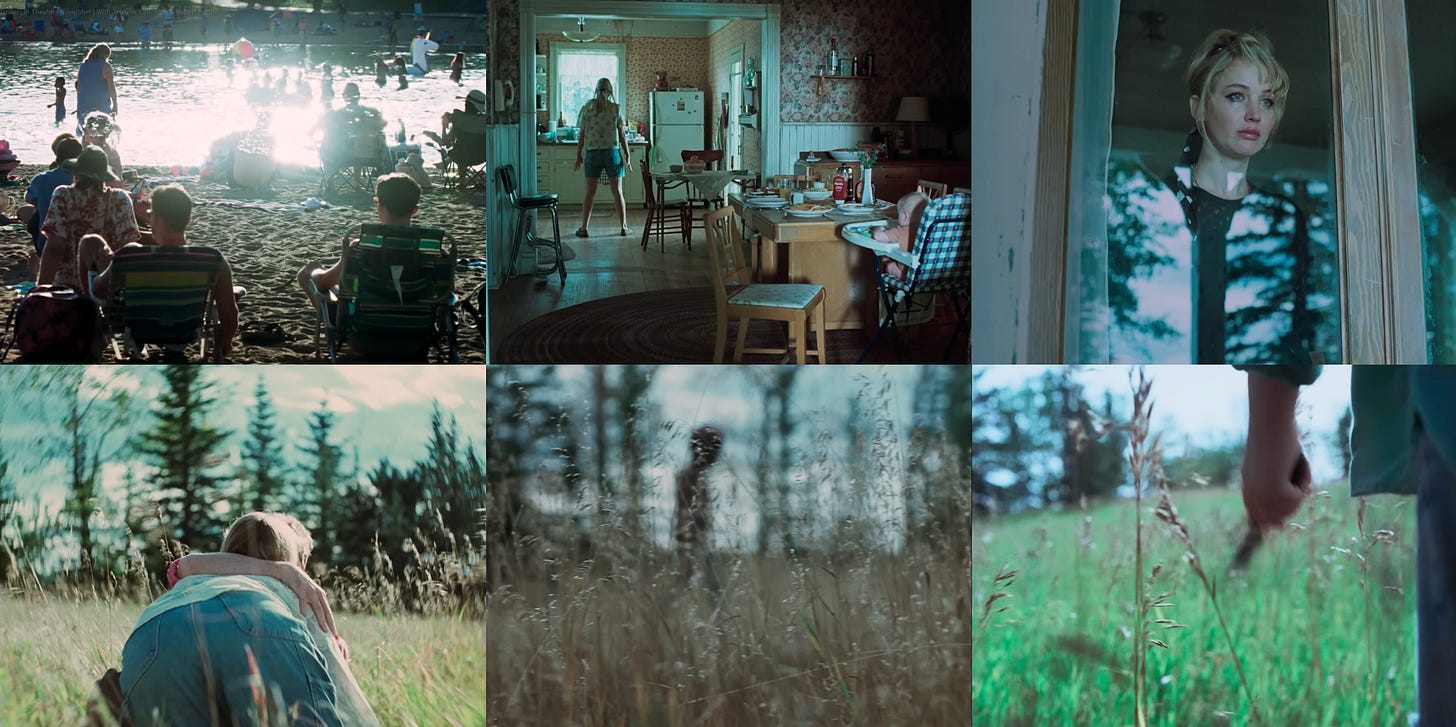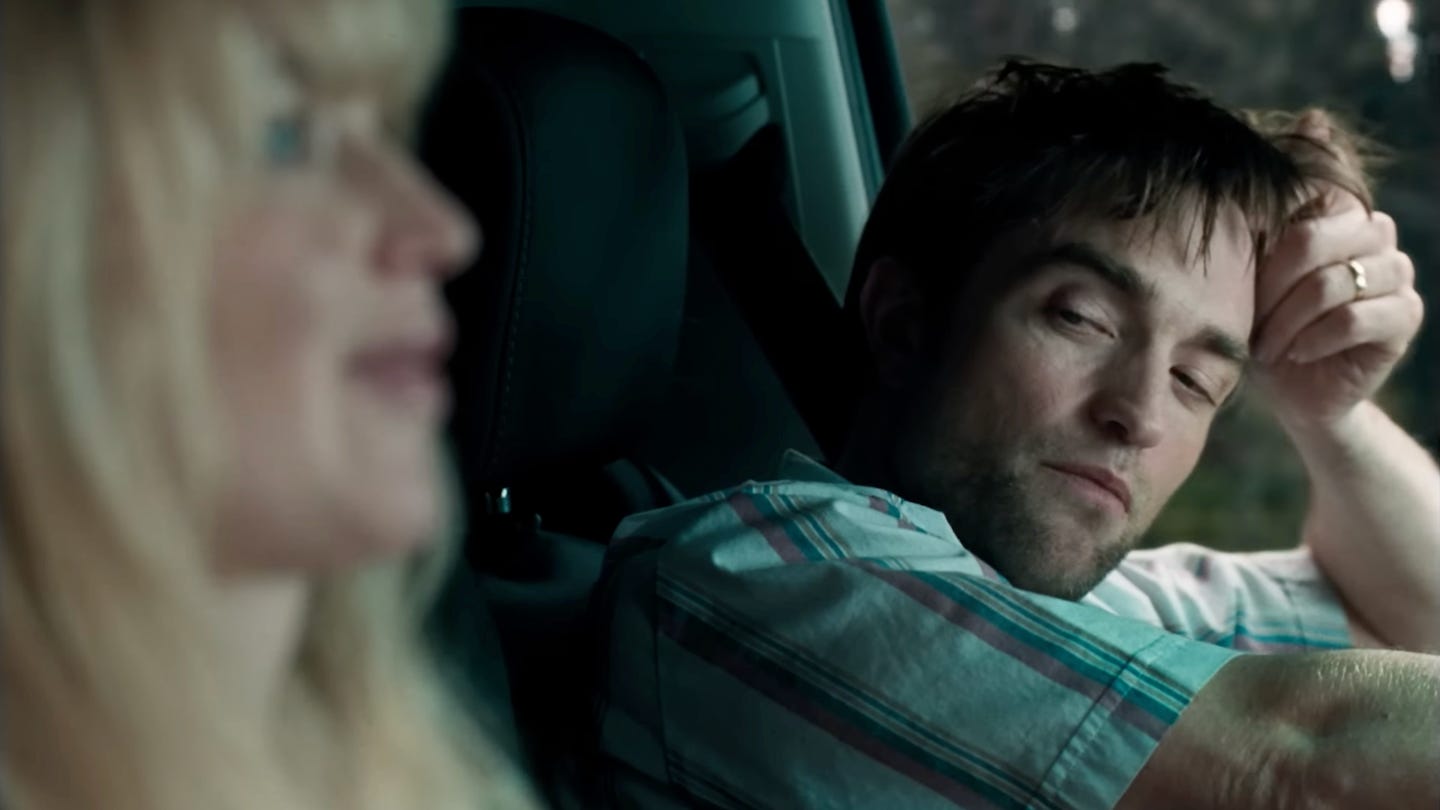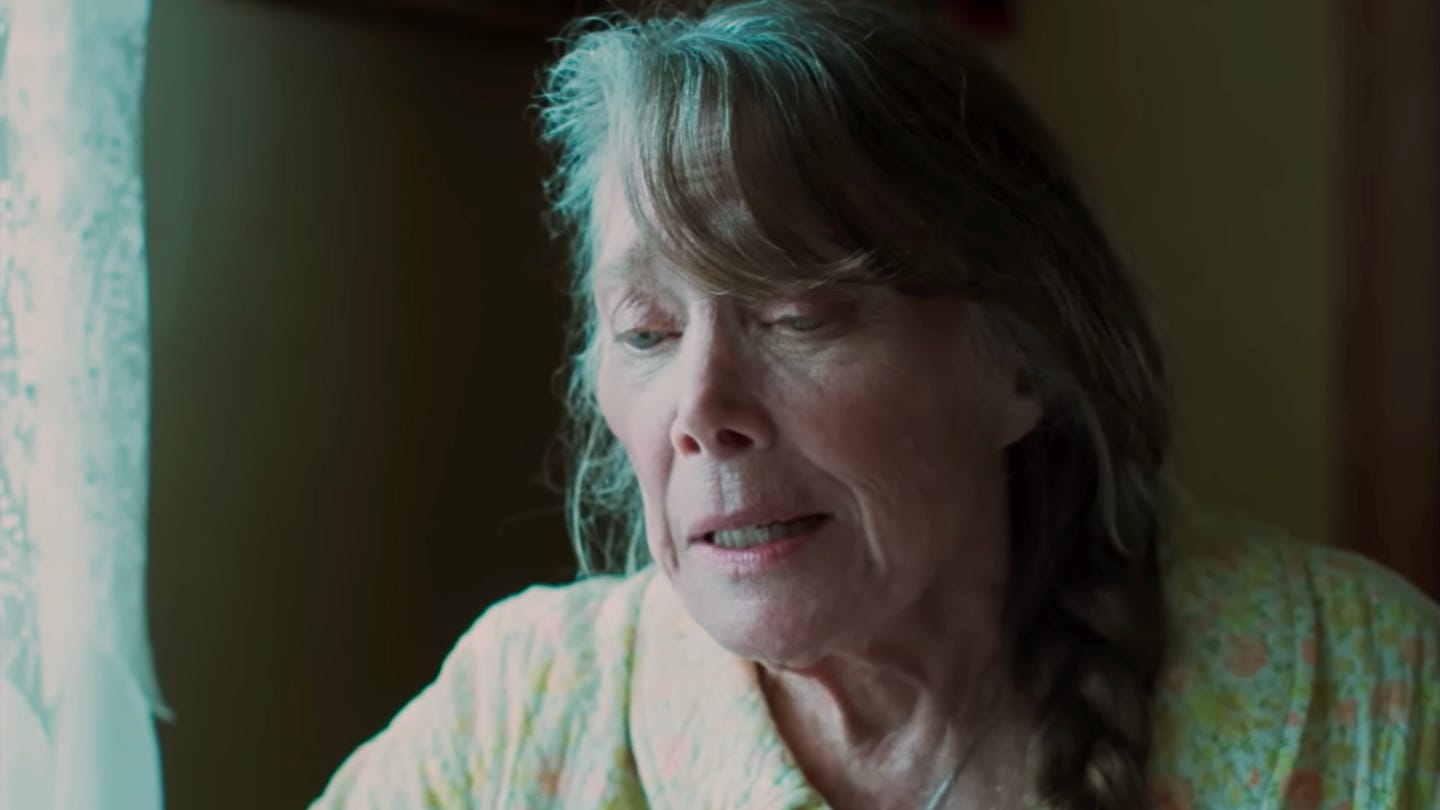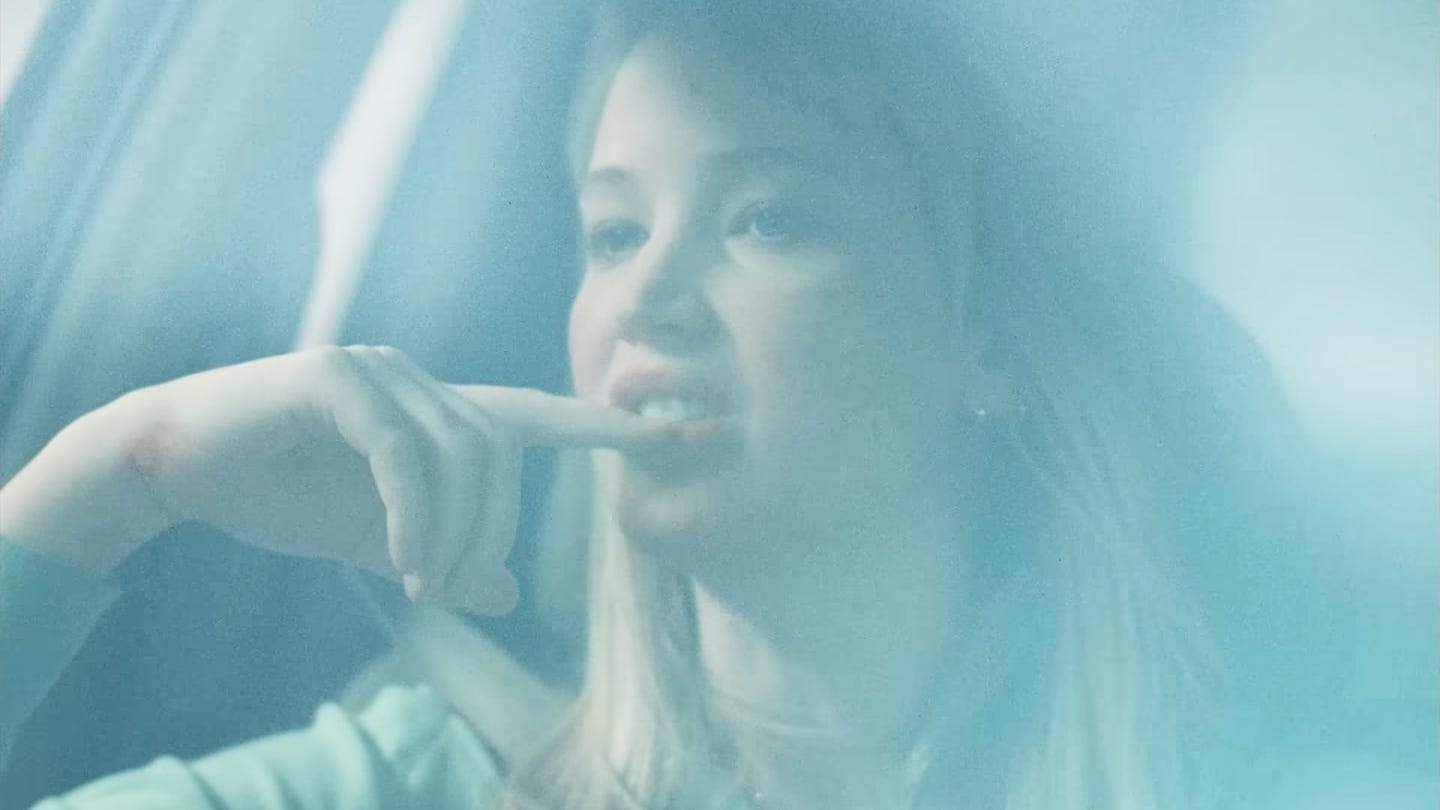Review: "Die My Love" is a harrowing career high-point for Jennifer Lawrence
Lynne Ramsay's latest is so far the great cinematic achievement of 2025
“Where are you, Grace?”
“I’m right here. You just can’t see me.”
Lynne Ramsay’s Die My Love is of the most viscerally stressful and deeply upsetting films I have ever seen; it’s also frequently beautiful, at times wryly funny, and always aching with a palpable, compelling humanity. Based on the 2012 Argentinian novel by Ariana Harwicz (Matate, Amor, or Die, My Love – Ramsay removed the comma), the film stars Jennifer Lawrence (also producing through her own company, Excellent Cadaver) as a new mother, Grace, struggling with postpartum depression; though saying it that matter-of-factly sounds overly pat for how Ramsay approaches her subject matter. This isn’t so much a film about postpartum depression as it is a film told of and through this state of mental distress. I would compare it to what Lars Von Trier did for depression in 2011’s Melancholia – forcing the viewer to experience the mindset and sensations of living with the disorder, rather than merely ‘depicting’ it – except that Die My Love is an even more abrasive and forthrightly avant-garde film than Von Trier’s.
Indeed, despite the presence of two major movie stars (Lawrence and Robert Pattinson, playing Grace’s husband Jackson), Die My Love has much less in common with anything moviegoers will see in a commercial multiplex than it does the experimental films of Stan Brakhage, which feel like an immense influence here. Scenes of the central couple negotiating the intangible space between them across their new home reminded me of Wedlock House; images of and within the forest – and the images and sensations that forest brings out in Grace – recall the sylvan odyssey of Dog Star Man; and one of the film’s most distressing subplots, about a dog neither Grace nor Jackson will take responsibility for, ultimately felt in communion with Sirius Remembered, where Brakhage photographed the decomposition of a deceased pet in his yard over many months. In short, Die My Love feels like something of a stylistic or spiritual descendent to any film where Brakhage weaved his camera through a home, a yard, or the woods, and/or where he turned bodies into spectral dancers on screen. Director of Photography Seamus McGarvey (a great and deeply underrated cinematographer) moves his camera in similar ways, capturing spaces in similarly ethereal, liminal fashion, and allowing light to bounce off his lens in similarly striking, ghostly patterns. And Ramsay directs and blocks her actors much more like interpretive dancers than traditional movie performances. It’s a little like Terrence Malick, but with less twirling; the ‘dances’ here are more visceral, less symbolic, and confrontationally vulnerable.
To say Jennifer Lawrence thrives in this environment would be an understatement. I thought a lot, watching Die My Love, about how she was probably born in the wrong era. Despite anchoring two major franchises in the 2010s – X-Men and The Hunger Games – Lawrence just wasn’t built for the IP-obsessed 21st century. She doesn’t have whatever bone it takes to pretend to give a shit about the franchise fare that made her famous, and reached the end of both those series with an exhaustion so palpable it felt uncomfortable to watch (we go to X-Men movies for escapism, not to be reminded what it’s like to be miserable in a job you hate). But when you give Lawrence an honest-to-God challenge, she will rise to it. Die My Love is her greatest challenge to date, and produces a performance so startlingly full-throated that it can properly be called revelatory. She acts here with her whole body, in total commitment to the strange, scarred dance steps Ramsay puts her through, embodying a woman who feels every inch of her body, yet cannot understand anything it comes into contact with.
What Lawrence’s performance engenders is a sense of tactile isolation from the world: the body becoming an inescapable asylum, both refuge and prison. Roger Ebert once said movies are a machine for generating empathy, and while I don’t want to be too gender essentialist here, I struggle to imagine any cis man open to experiencing empathy walking away from this film without a deeper, richer sense of understanding and compassion for women, their bodies, and the expectations labored upon them. This is, perhaps, the fundamental function of art in its purest form: to take what is on the inside and express it on the exterior. To transmit something true and deeply felt to others who have not felt (or can not feel) it.
Pattinson is similarly great, as always, playing brittle, shaky, and bruised in ways he is uniquely capable of illustrating. Jackson is a tricky part, woefully insufficient (and potentially unfaithful) as a husband and domestic partner, yet not outright malicious; he wants to understand his wife, and his worst qualities are continually amplified the more he finds himself incapable of that task. And because the film is so thoroughly a first-person subjective narrative through Grace’s eyes, we’re never really ‘seeing’ him, so much as we are seeing her perception of him. That Pattinson can thread this needle – between illuminating some underlying core truth to this deeply flawed man, and taking the cues from Lawrence necessary to position this character as perceptively phantasmal – speaks to why he is one of the finest actors of the generation.
Die My Love is mostly a two-hander, though it has room for a brief but very moving turn from Nick Nolte, and some quietly astonishing work from Sissy Spacek, as the mother-in-law who seems to at least somewhat understand what Grace is going through. There is an interesting generational communion at work here: Spacek was born in the era Lawrence would have thrived in, I think, working with directors like Malick, Altman, and De Palma in bold, breakout works across the 1970s. But of course, Spacek had her own share of disappointments from Hollywood in the years that followed; after she won her Oscar for Coal Miner’s Daughter in 1980, the industry often didn’t know how to utilize – or even have a place for – her profound potential. There weren’t opportunities for women like Lynne Ramsay to make the kind of bold formal leaps Altman, Malick, or De Palma were afforded back then. It’s possible Lawrence was born in the right time after all, and that the years of mucking through franchise slop was worth it to reach Ramsay today.
2025 still has two months and plenty of movies left to go, but as of today, Die My Love is the single most robust, skillful piece of filmmaking I have seen all year. The cinematography alone is such a titanic accomplishment. Shot in ‘Academy Ratio’ 1.33:1, Ramsay and McGarvey understand how crucial height is to that particular shape, and use it to often overwhelming effect. This is a film that towers over the viewer, astonishing us not only with landscapes and tactile, embodied camera motion, but with close-ups of hurt human faces, aching for us several stories tall. I don’t think the Oscars will touch a movie like this with a 20-foot-pole, but if they do, it should be a shoo-in to win not only Cinematography, but also Sound Design (the soundscape is so immersive and unrelenting that it becomes the most upsetting part of the whole experience), and maybe Editing, which feels both stream-of-conscious and highly precise.
This is not an “enjoyable” film, except in the sense that it is always enjoyable to watch great artists do great work and push at perceived boundaries. It is a harrowing watch, and one I can’t imagine myself coming back to often. There is nothing even approaching catharsis waiting for viewers at the end, let alone ‘answers.’ And my only nagging worry throughout was that the film might try for that, out of a feeling the audience was owed a ‘neater’ takeaway after two hours of challenge. But Ramsay is smarter and more uncompromising than that. This is a film about subjective experience, and specifically the subjective experience of feeling lost, adrift, angry, and confused, at war with one’s body, mind, and surroundings. Humans can work through all that and come out on the other side intact, of course; but sometimes they don’t. And either way, the story of recovery is a separate one to what is being chronicled here. Ramsay is right to leave us where she does, on the edge of a knife balanced precariously between hope and despair. The film stands as a remarkable testament to cinema’s power of expression: how the camera can take indescribable internal realities and externalize them on a giant screen.
When extolling ‘big-screen experiences,’ we too often default to expensive commercial blockbusters, or films with fantastic settings and effects; I certainly hold myself guilty of this at times. So I want to underline how crucial the space of the theater is to what Ramsay is doing here – how much it matters having a great big screen to get lost in these images; to have immersive, all-enveloping sound to root us in Grace’s perspective; to have a dark room free of distractions to encourage the kind of concentration and humility it takes to engage with challenging art. As much if not more than any movie this year, Die My Love is a truly essential theatrical experience. See it while you can; works like this don’t come often, and they don’t stay in theaters for long.
Read the book 200 Reviews by Jonathan R. Lack in Paperback or on Kindle
Subscribe to PURELY ACADEMIC, our monthly variety podcast about movies, video games, TV, and more
Like anime? Listen to the podcast I host with Sean Chapman, JAPANIMATION STATION, where we review all sorts of anime every week. Watch on YouTube or Subscribe wherever you get your podcasts.


